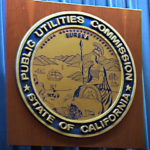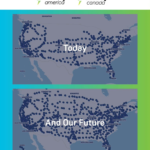A move in Illinois to increase the annual EV registration fee to $1000 is alarming electric vehicle owners, but EV owners must see this in the context of the bigger picture. How are the roads paid for? When and how will electric vehicle owners pay their fair share of the highway infrastructure? How can fees for road infrastructure be levied fairly across all vehicle drivers?
Highway infrastructure funding
The answers to those questions are too large for this little blog post, but they are the questions which must be asked. Several years ago I wrote an article about highway infrastructure funding as electric vehicles are more broadly adopted, for Charged EV’s Magazine. The article scanned across the USA at plans in several states, and along the way a few ideas came up.
The first is that in the USA highway funds are collected from gasoline taxes. Before the 1990’s this was a fair process. It is respectful of privacy, meaning the government does not collect personal data as a side effect of collecting the gasoline tax. It fairly charges more gas tax to those who drive more. It collects the gas tax in the vicinity where the vehicle is driven, meaning a driver can cross state lines and end up paying gas tax to the state where they’re driving.
But starting with the 1990’s and increasing fuel efficiency from hybrid cars, plug-in hybrid cars and now electric cars, the gasoline tax is a less efficient way to collect road funds. High fuel efficiency cars are great for the environment, but it means the government collects less gas tax revenue per mile driven. And of course electric cars pay no gas tax per mile driven.
Plans in Illinois
But let’s get back to Illinois. HB3233![]() is a large bill looking to make a lot of changes to how transportation system contracts, jobs, and funding is handled. The new EV tax is one small provision in a very large bill. And the bill affects not just EV drivers but gasoline vehicle drivers.
is a large bill looking to make a lot of changes to how transportation system contracts, jobs, and funding is handled. The new EV tax is one small provision in a very large bill. And the bill affects not just EV drivers but gasoline vehicle drivers.
From Jan 1, 1990 through July 1, 2019, the gasoline tax is $0.19 per gallon. After July 1 this year, Illinois seeks to raise that to $0.44 per gallon. Further, before June 1 of every year the Illinois Legislature is supposed to evaluate a yearly gas tax increase, and potentially increase that tax on July 1. Further, the tax for diesel fuel is 8 cents a gallon more than the gasoline tax.
For electric vehicles beginning on July 1, 2019 there is an annual registration fee of $1000. That’s the fee electric vehicle owners are concerned about. Then, by June 1 of every year the Illinois Legislature is to evaluate an increase of this fee, and any increase will take effect on July 1.
The word hybrid does not appear anywhere in this law, so it’s not clear whether a Plug-in Hybrid would count as a gasoline vehicle or an electric vehicle for purpose of these fee’s. This change may have an unintended side effect of consumers switching from pure EV’s to PHEV’s.
Possible ways to collect highway infrastructure funds
The states are between a rock and a hard place. The current policies have resulted in high efficiency vehicles that are environmentally great, but drying up a highway funding system dependent on gasoline taxes. As a result most states are facing funding shortfalls.
As said earlier, I wrote this article for Charged EV’s Magazine and therefore had a chance to think through a few things.
The value of the gas tax system is as an anonymously collected fee, collected near the area of usage, and directly corresponding to highway usage. The problem is how to implement those features in light of vehicles that use zero gasoline and can recharge from any power outlet.
Yearly flat fee based on vehicle type
Every vehicle driver pays a vehicle registration tax every year. There is an existing enforcement system, namely police officers looking for out-of-date registration stickers.
What if the gasoline tax were completely eliminated, and at the same time a steep increase was made for registration of every type of vehicle? This would be fair across the board, with everyone paying the same fee.
Taxing charging sessions
For example, one approach might be forcing every charging system to be connected to the Internet. The charging station owner can use that for controlling the charging station, and as a side effect the state can levy taxes on the charging session. But this would force every charging station to be connected to a charging network. A large portion of the charging stations do not even have any computer intelligence. And a large portion of drivers simply plug into a power outlet.
Would those of us who charge at home using a non-networked charging station suddenly become outlaws for failing to pay a tax for charging our vehicle?
Yearly report of miles-driven and a miles driven fee
What if with the vehicle registration every car owner reported the odometer reading, and therefore the miles driven. They could then pay a yearly fee based on miles driven. It would be applied across the board to every driver irregardless of the fuel used in their vehicle.
A self reported miles driven figure has the potential for abuse, of course, so perhaps there might be a process of occasional inspections.
This is good. The government would know a new thing about the driver, how many miles they’ve driven, but at least the government doesn’t know where they’re driving. A downside is that a driver does not get a tax credit for miles driven in another state — rather, that other state is not paid because the driver entered that state.
Wireless reporting of miles driven
Just as there are transponders to automatically collect bridge tolls or highway tolls, there could be a transponder to collect miles driven taxes. In a sense every road would have to become a toll road, with every vehicle having a transponder pinging the road system as we drive. The data collected could be used for many things such as congestion control, beyond collecting a road usage tax.
There’s even an acronym for this – Vehicle-to-Infrastructure – meaning digital data communications between every vehicle and the road infrastructure. Imagine a smart traffic light that knows exactly how many cars are waiting at the intersection, and can adjust timing to improve vehicle flow?
The problem with this is Big Brother, because suddenly the Government would know our every move.
Bottom line
Changes have to be made to how the road system is funded.
The government’s job is to provide for the common welfare of us all. Says so in the US Constitution, plus any objective analysis of the role of Government is that Governments are supposed to serve all residents equally.
Therefore it is the role of Government to organize a road system. The word “welfare” doesn’t mean the Government gives it away for free. Instead the word “welfare” means simply “well-being” meaning in this case that the Government must set up a system of paying for the road system while providing it for the use of all residents.
The gasoline tax was that system. But given that our goal is to replace gasoline vehicles with electric vehicles, the gasoline tax must be phased out and replaced with something else.
Among the ideas I outlined above, my preference is a self reported yearly vehicle miles driven tax.
- Is there enough Grid Capacity for Hydrogen Fuel Cell or Battery Electric cars? - April 23, 2023
- Is Tesla finagling to grab federal NEVI dollars for Supercharger network? - November 15, 2022
- Tesla announces the North American Charging Standard charging connector - November 11, 2022
- Lightning Motorcycles adopts Silicon battery, 5 minute charge time gives 135 miles range - November 9, 2022
- Tesla Autopilot under US Dept of Transportation scrutiny - June 13, 2022
- Spectacular CNG bus fire misrepresented as EV bus fire - April 21, 2022
- Moldova, Ukraine, Georgia, Russia, and the European Energy Crisis - December 21, 2021
- Li-Bridge leading the USA across lithium battery chasm - October 29, 2021
- USA increasing domestic lithium battery research and manufacturing - October 28, 2021
- Electrify America building USA/Canada-wide EV charging network - October 27, 2021















